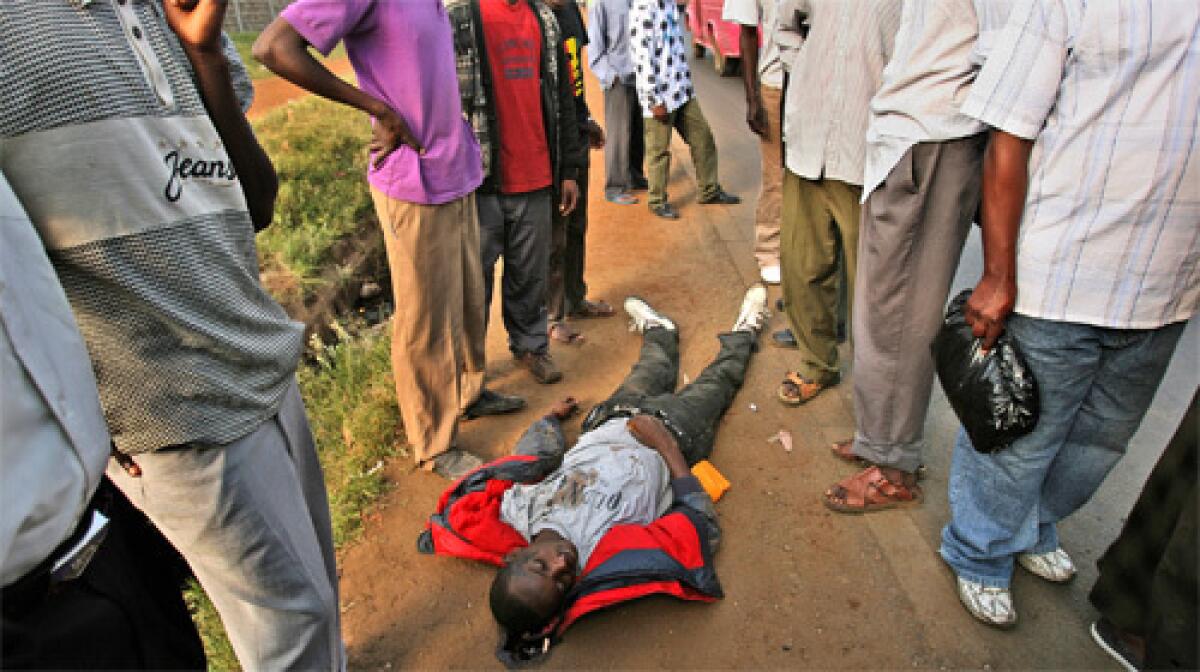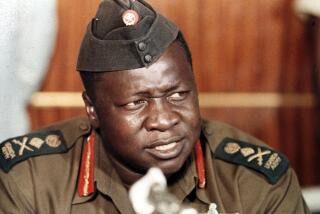Talks held to curb Kenya’s unrest

As the head of the African Union met with Kenya’s political rivals here Wednesday to try to get them talking, opposition supporters waited tensely on the streets for news and warned of more violence if President Mwai Kibaki stays in power.
John Kufuor, the AU chairman and Ghana’s president, met separately with Kibaki and opposition leader Raila Odinga, trying to help steer them toward a political resolution to end tribal violence that followed their disputed presidential contest. There was no official comment on the substance of the talks, nor any sign that the two rivals would meet.
Later Wednesday, Kibaki accused some politicians of fanning recent violence and vowed to bring them to justice. He also ruled out new balloting, saying the election was “finished.”
The Dec. 27 vote, which Kibaki claims to have won and Odinga says was rigged, triggered widespread tribal killings, shattering Kenya’s reputation as a stable country and damaging its tourist industry. As a peace deal has eluded international diplomats, the tribal anger and divisions have hardened.
Across Kenya, more than 250,000 people have fled their homesin violence that has largely involved members of the Kikuyu, Luo and Kalenjin tribes. Kikuyus have fled areas dominated by Luos, while Kalenjins and Luos have fled Kikuyu-dominated areas, in what could become permanent divisions.
Kibaki, who was sworn in for a new term Dec. 30, on Tuesday named his vice president and 17 members of his Cabinet. The move angered the opposition, which says he seized power illegally and has no right to form a government.
Kibaki selected Kalonzo Musyoka, a member of the Kamba tribe who came in third in the presidential race, as his vice president. His decision sparked new violence against Kambas, who had been spared from earlier attacks.
Kibaki, a member of the dominant Kikuyu tribe, says the final Cabinet will be broad-based, and will represent the will of the people. After meeting with Kufuor, he issued a statement promising to reach out to other leaders.
“Now that peace was returning to these parts, his partially formed government would continue to reach out to Kenyan leaders who would also be encouraged to play their role in preaching peace among their followers,” the statement said.
Kibaki later flew to Burnt Forest in the Rift Valley. The nearby town of Eldoret was the scene of some of the worst recent violence, including the burning of a church on the outskirts that left an estimated 35 people dead. Tens of thousands of Kikuyus have fled the region.
The president urged residents not to move and promised to bring to justice those responsible for the violence. He also pledged money to help displaced people resettle and rebuild.
“The politicians inciting people to commit violence -- don’t worry, the government will arrest them and charge them in court,” Kibaki said. “They know who they are.”
After Kibaki’s Cabinet announcement Tuesday, angry opposition supporters poured into the streets in Huruma, a slum district of Nairobi, stoning cars and shops and targeting Kambas, Kikuyus and others.
Isiah Mwale, 40, who cooks deep-fried snacks similar to doughnuts at a roadside stand, was forced to flee.
“They were looting,” he said. “They said they didn’t want us here.
“They looted me. They took my money and my bucket with dough. They frightened me very much,” said Mwale, a member of the Luhya tribe.
Paramilitary police fired tear gas at the crowd and bullets into the air to disperse protesters.
Stephen Areka, one of dozens of opposition supporters who gathered in the area Wednesday, said they were ready to protest again if Kufuor failed to persuade Kibaki to step down as president and allow a transitional government to rule until new elections.
“Everywhere in this country is chaos,” he said. “Kenya is not at peace at this moment.”
Areka, 32, who said he was an area organizer for Odinga’s Orange Democratic Movement, warned that if Kufuor left the country without a breakthrough, “then Kenya will be in trouble. The whole country will be in trouble, especially people from President Kibaki’s tribe, and chaos will erupt in the whole country.”
Lying by the roadside in the neighboring Mathare slum Wednesday was the body of a young Kamba man, whose family believes he was killed in the tribal violence.
Jackson Muthiana, a trader, left his home in Dandora early in the day by taxi, heading for downtown Nairobi about six miles away. His body was found halfway along the route, the area where Kambas were being attacked overnight.
Muthiana had a bleeding wound on the back of his head. “It looked like someone had hit him,” said his sister-in-law, who asked not to be identified.
More to Read
Start your day right
Sign up for Essential California for news, features and recommendations from the L.A. Times and beyond in your inbox six days a week.
You may occasionally receive promotional content from the Los Angeles Times.






